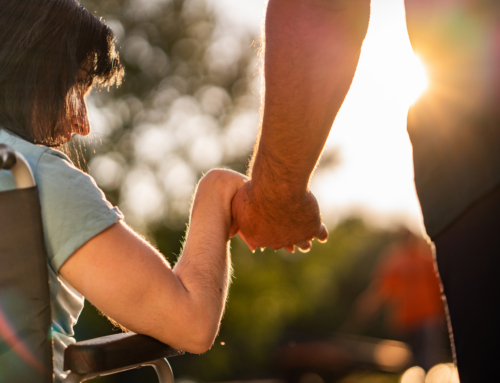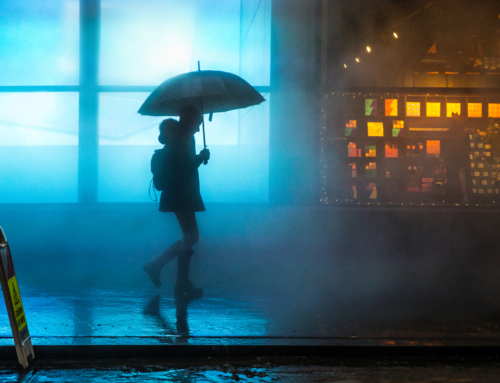During this global pandemic we invite friends to share their perspectives with us. Today we welcome Topher Endress, from the University of Aberdeen Centre for Spirituality, Health and Disability.

I study the link between disabilities and the ‘built environment’ – the buildings we build and how we design them, the roads we pave, the relative locations of stores and homes, even the supply chains of our produce and goods, etc. Now that COVID-19 has placed the UK on lockdown, with nearly everyone challenged to work (and worship) from home, I cannot help but see the underlying ethical assumptions behind the intersection of our new environment. When this crisis gives way to whatever comes next, my prayer is that we have learned from the disability community whose witness COVID-19 has now proven prescient.
Much like any story of disabled folks (“is this news story about a disabled prom king uplifting, or is it really filled with pity?”), the coronavirus is a question of interpretation. Is COVID-19 a story of globalisation gone wrong? Political leaders sacrificing human lives to save public relations? Ecological re-balancing? What we choose to emphasise in this situation says a great deal about what we believe.
Among the many ways in which this pandemic might be interpreted, I view it as ‘the great culmination’ of our social desires; in the West, we so regularly pine for our individuality, we rely on utilitarianism in medicine, and we ignore the undercurrent of eugenics and our related fears of death. We like to think we can be self-reliant. We like to think we are not vulnerable. COVID-19 and the resulting lockdown have taken those assumptions and shoved them down our throats. We want to be self-reliant? Fine, you are now on quarantine and cannot see your community. We want to build our medical world around ‘the greatest good for the greatest number?’ Fine, it serves the greatest good for you to buy sensibly, stay indoors, and make radical changes to your lifestyle. I think we can see how well most people took to that idea (or rather, did not).
Now confronted with the lack of community, did we truly want our ‘individual freedom?’ When faced with social restriction on our buying and movement, do we truly accept ethics as ‘the service of the greatest good for the greatest number?’ When thinking of making decisions on care and the distribution of supplies, are we actually happy with the ways in which we’ve determined the value of human life? In many ways, this virus may have helped uncover the problems of how we’ve built our world; when we value profits over people, when we value ourselves over our neighbours, when we value the comfort of a ‘healthy’ body over the saving of a sick one, we refute the inbreaking Kingdom of God. We build an alternate city in our own image, rather than eagerly anticipate the coming City of God.
Disability theology has been at the forefront of these conversations for years, well before Boris Johnson and Prince Charles were part of the ever-growing statistics. Those with disabilities know first-hand that no one is truly independent. One might utilise a wheelchair, another a Sign interpreter, another specialised medicine, still another repetition and low-stimulus environments. Others rely on farmers to grow their food, sanitation workers to remove their waste, road workers to connect them to the world, and IT professionals to keep their internet working. No one lives in this world alone, disabled or not. But it’s typically only the disabled who are forced to acknowledge it. At least, until now.
Disabled activists have been clear that medicine is a poor way to understand the world. Rather than presume there is one kind of perfect, healthy body, disabled folks know that bodies (and health) are different for each person. When hospitals in Italy are deciding to give their limited respirators to younger, seemingly healthier patients, they are leaning into this assumption of a ‘normal,’ or more standard body. As if being older or having Cerebral Palsy or a lung condition were not also part of normal life. I do not envy the nurses and doctors forced to make choices on who to give limited resources to, but their individual decisions to condemn older and disabled patients are critiqued at every moment by the vibrancy of lives lived by disabled folks. As well, and at long last, the supply chains which force limited resources in a world of abundance are finally exposed to the public as unethical.
Disability Theology acknowledges that vulnerability is complex. Some are vulnerable because the world is broken. But everyone is in some way vulnerable, and this is not a bad thing. To be cut off from prescription medication unexpectedly is oppressive and morally evil, but to simply be subject to the laws of death in this world is not. To acknowledge the ageing and diversity of bodies is good, but to make value claims from those differences is wrong. Physical touch is good, but virtual connections when physical presence is impossible are necessary. These are some insights of Disability Theology pre-COVID, and it is my hope that as this disruption continues, we will confront these questions on a wider and more public social scale.

Topher Endress is a current PhD candidate in Theological Ethics at the University of Aberdeen, where he is also a Friendship House Fellow through the Centre for Spirituality, Health and Disability. His work primarily connects disability theology with human geography and liturgy studies. He and his wife are the proud parents of a 2 week old baby, who has proved to be an excellent distraction during the recent UK lockdown.


